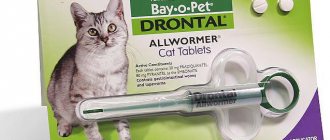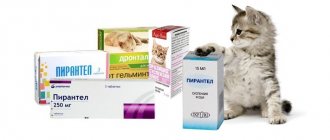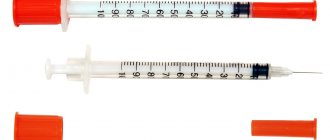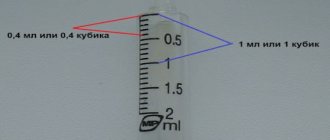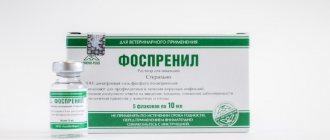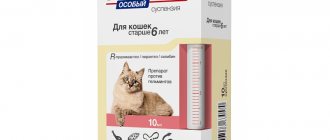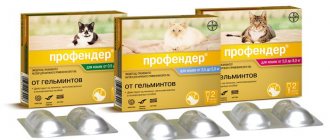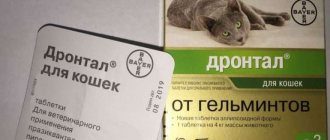Parasitic infestations cause enormous harm to the health of animals: they weaken the immune system, poison the body with toxins, and damage internal organs. Therefore, you need to start fighting them as quickly as possible. Azinox for cats and dogs is a veterinary anthelmintic drug that helps remove tapeworms in one day.
Let's figure out how it works, what infestations it helps with, and what pet owners say about its effectiveness.
Composition and action
Tapeworms (cestodes) are the most dangerous type of intestinal parasites that can penetrate the body of pets. Azinox contains praziquantel as an active ingredient, which is highly effective against helminths.
Within half an hour to an hour after using the medicine, it reaches the maximum concentration in the blood plasma, then enters the intestines, where it causes paralysis and death of parasites. The drug is safe for animals.
Praziquantel is a synthetic substance that causes muscle contraction of the parasite and its paralysis, leading to the death of the worm. The substance exhibits maximum effectiveness in relation to:
- trematodes - flukes;
- cestodes - tape helminths.
Indications for use
Azinox is intended for the treatment of cestodiasis, parasitic infestations caused by tapeworms. This medicine is most effective for helminth infections of the small intestine. In cases where worms are in the lungs, liver, heart and other organs, Azinox is used as part of complex therapy.
Veterinarians recommend using this remedy to treat diseases:
- dipylidiasis;
- taeniasis;
- mesocestoidosis;
- diphyllobothriasis;
- echinococcosis.
Purpose
Azinox is used for the prevention and treatment of helminthic infestations if the causative agent of the disease is identified. During preventive deworming, it protects the pet’s body from tape parasites and flukes, but is ineffective against roundworms (nematodes), due to which it does not exclude infection by the latter.
The drug is effective for the following types of helminthic infestations:
- taeniasis;
- echinococcosis;
- dipylidiosis;
- diphyllobothriasis;
- mesocestoidosis, etc.
The danger of cestodes is that they not only poison the body with traces of their vital activity, but also disrupt the functioning of vital organs. It is difficult to treat cestodiasis: the parasites create a protective calcareous shell around themselves.
Tapeworms parasitize the small intestine. They differ in size and can reach a length of up to 60 cm. The body of the helminth consists of many segments, each of which contains a large number of eggs. When they mature, the segment falls off from the body, and the larvae develop further.
With a small number of parasites in the pet’s body, the symptoms of infestation may not be noticeable. Severe infection is manifested by the following symptoms:
- vomiting, diarrhea, or constipation;
- hypovitaminosis;
- inflammation of the glands;
- itching around the anus, in which the cat often licks the anus.
Hydatigerosis is a helminthic infestation caused by tapeworms that parasitize the small intestine. The disease is severe in young animals: it manifests itself as a disorder of digestive function, sometimes with intestinal obstruction.
Another type of disease is hymenolepiasis. The causative agent is the dwarf tapeworm, the smallest tapeworm. It can only be detected by analyzing stool. A minor infection does not manifest itself clinically, although sometimes when helminths damage the intestinal walls, diarrhea and intestinal inflammation are possible.
Another type of helminthic infestation is mesocestoidosis. A severe infection is dangerous, which leads to severe digestive upset, dystrophic processes in the intestines, and intestinal blockage.
Can it be used?
This product is intended to destroy worms in cats and kittens at any stage of their development. The medication can also be used to prevent helminthic infestations.
The basic principle of the drug’s action is that the substances contained in the medication cause paralysis of the muscular system of the helminth and lead to its subsequent death.
Regular and "plus"
There are 2 forms of the drug. The differences between them are minimal and mainly come down to different dosages and the presence in the latter of praziquantel in a higher concentration and pyrantel pamoate. At the same time, the “plus” option is not suitable for cats, because The composition is designed for dogs.
Treatment and dosage
Praziquantel has shown maximum effectiveness and reliability in the treatment of cestodiasis among a large number of synthetic anthelmintic drugs. Due to this, Azinox is often used when a pet is infected with tapeworms. It is given once, with food or forcibly.
It is very important that the use of the drug promotes the natural removal of worms and their larvae from the cat’s body. When the parasites die, toxins are released, but praziquantel ensures that the helminths leave the intestines paralyzed but alive, so the risk of intoxication of the pet’s body approaches zero.
Taking an antiparasitic drug does not require preparation of the animal - the use of special diets or cleansing enemas. It is better to give the medicine in the morning, during feeding.
The standard dose is 5 mg of active substance per 1 kg of animal body weight. For tablets, this is 1 tablet/10 kg of cat weight. It is not recommended to violate this dose, since exceeding the dosage can lead to negative side effects.
The standard dose is 5 mg of active substance per 1 kg of animal body weight. For tablets, this is 1 tablet/10 kg of cat weight. It is not recommended to violate this dose, since exceeding the dosage can lead to negative side effects.
It is best to give medicine to small cats (up to 5 kg) in the form of a suspension, which can be prepared by crushing the tablet into powder and diluting it with water:
- Dilute 1 tablet in 10 ml of water;
- administered using a regular small-volume syringe without a needle at the rate of 1 ml/kg body weight.
Important!
The drug can be used both for the treatment of invasion and for prophylactic purposes.
To prevent infection with helminths, it is recommended to carry out treatment at least once a quarter, as well as before vaccination.
Reviews
Owners
Natalya K., Sevastopol:
“I have been using Azinox for several years to prevent helminth infection. The pet tolerates each dose of the product quite well. There have never been any side effects.
We get tested every six months; worms have never been detected. They stopped taking it only during pregnancy, because... there was no desire to risk the life of the cat and kittens.”
Svetlana M., Smolensk:
“The veterinarian prescribed the product to prevent infection with worms. An hour after administration, the pets began to vomit horribly. And this whole nightmare lasted about 7 days. I had to deal not with prevention, but with full-fledged treatment.
We went to the veterinarian, and it turned out that the pets had an individual intolerance to Azinox. For prevention, another medication was prescribed. I will never give Azinox to kittens again and I will discourage my friends from using it.”
Victor G., Simferopol:
“After the dacha, the cat acquired worms. After passing the tests, Azinox was prescribed. At first I had no desire to poison the animal, and the reviews on the Internet about it are not the best. But the doctor assured that the product was completely harmless and all problems would be solved after taking one tablet.
I bought some medicine at the pharmacy and the low price immediately alerted me. The cat had to dilute the substance because... It was not possible to give it with food. After 2 hours, severe vomiting began, which continued for several days. The animal lost a lot of weight and lost its appetite. I had to feed him water and glucose for a long time.”
Veterinarians
Tatyana V., veterinarian, Moscow:
“There is a serious misconception that Azinox can be used for prevention. In fact, it is completely useless for roundworms. Therefore, it should be used only after examination and determination of the type of worms in cats and kittens.
At the same time, as a doctor, I often have to deal with the consequences of treatment in the form of vomiting and diarrhea. “I prefer to prescribe more expensive but less toxic imported drugs.”
Sergey P., veterinarian, Vladivostok:
“The medication is generally not bad, but I try to prescribe it to cats and kittens as rarely as possible. The reason is frequent complaints from owners about side effects in the form of vomiting and diarrhea. There are other medications without such an effect. If there is no other alternative, then this drug will do.”
Limitations, side effects
The medicine is as safe as possible for pets. Praziquantel does not accumulate in the body, does not have a toxic effect on animals, and is not addictive, so Azinox can be used for a long time without fear of a decrease in the therapeutic effect.
The manufacturer does not indicate in the instructions any restrictions on the use of the anthelmintic, except for age and the pet’s tendency to allergies. In case of an individual reaction to praziquantel, it is not recommended to use Azinox. Hypersensitivity to the drug and overdose can cause allergic reactions, in which case you should stop taking the drug and contact a veterinary clinic, where symptomatic treatment will be prescribed.
Important!
An anthelmintic drug should not be used on small kittens under three weeks of age.
Contraindications and side effects
Azinox is usually very well tolerated. There are practically no side effects from taking the medicine. Hypersensitivity phenomena are possible, which disappear after discontinuation of the drug and therapy with antihistamines. No clinically proven cases of overdose have been identified.
There are practically no contraindications for taking Azinox, with the exception of hypersensitivity to the active substance.
There have been no reliably recorded cases of negative events resulting from an overdose of the drug.
Can it be used in pregnant cats and kittens?
Therapy for helminthic infestations in cats, both for preventive and therapeutic purposes, should be carried out before pregnancy. During pregnancy and lactation, treatment with Azinox is not advisable without a doctor's prescription.
Antihelminthic drugs are not prescribed for pregnant cats.
It is also not recommended to take this drug in kittens before they reach the age of three months.
Interaction with other drugs
There are no clinically significant negative effects when taken simultaneously with other drugs.
How does Azinox work?
Praziquantel, which is part of the drug, has a blocking effect on the muscles of tapeworms, deprives them of activity, and destroys the epithelial cells of the parasites. Cestodes become defenseless against the influence of digestive enzymes and immune reactions of the cat’s body. As a result of treatment, Azinox tablets for cats kill helminths.
© shutterstock
Thanks to lactose and starch, the drug begins to act actively almost immediately after administration. The product reaches its maximum concentration in the cat’s blood within a period of 30 minutes to an hour.
Azinox effectively eliminates the symptoms of helminth infection in cats:
- lethargy, lack of physical activity;
- lack of desire to eat the usual food, change in taste preferences;
- discharge in the form of dried crusts in the corners of the eyes without visible signs of an inflammatory process;
- hair loss that has changed its usual appearance;
- alternating constipation with loose stools;
- blood in the stool;
- vomiting;
- increased abdominal volume due to bloating;
- absence of feces for several days, flatulence due to intestinal obstruction;
- decreased protective properties of the body;
- manifestation of signs of anemia in a cat in the form of a change in the color of the mucous membranes to a paler color;
- developmental lag of sick kittens compared to healthy kittens from the same litter;
- the appearance of fragments of flatworms in feces and vomit;
- involuntary muscle contractions, cramps.
The nature of the severity of symptoms in a cat when infected with helminths depends on the location of the parasites and the severity of the disease. The sooner the owner identifies the problem and gives the pet Azinox, the faster the recovery will come.
Storage
It is recommended to store Azinox in the manufacturer's box, preferably in a cool, dark place. Keep the medicine away from children and animals. The optimal storage temperature is from +10 to +25 degrees Celsius.
All tablets are packaged in special blisters made of plastic and foil. You need to take out the tablet only before use.
After the expiration date (it is 3 years from the date of production), it is prohibited to use the drug for treatment.
Analogs for worms
There are a lot of drug substitutes. The most famous of them are:
- Praziquantel:
- Biltricide;
- Milbemax;
- Pirantel.
These medications have more contraindications. Some of them are prohibited from being taken during the first half of a cat's pregnancy.
The medicine can be easily purchased at any veterinary pharmacy. The price level for tablets is low. According to the manufacturer, the drug is suitable for almost all animals. There are no difficulties when treating cats and kittens, because... the drug can be given in the form of a suspension.
Instructions on how to take
- Crush the tablet of the drug using a teaspoon.
- Pour the powder into a mug, and then add 10-15 ml of boiled water.
- Thoroughly stir the powder in water to prepare a suspension, then you need to collect it in a syringe.
- The suspension should be given to the pet little by little; it is advisable that you have an assistant who will hold the cat.
- Try to hit the palate, in which case the medicine will enter the esophagus.
The drug can be used both to remove worms from the cat’s body and for prevention. Be sure to read the operating instructions before use.
How to give the suspension
Who should not use it, consequences of overdose
Although Azinox is not toxic, it still should not be given to pregnant cats, as well as to kittens that have not reached 3 weeks of age. Praziquantel may have negative effects on the liver and cardiovascular system.
Sometimes parasites can settle in the eyeball, in which case you should not use the drug for treatment. Because parasites cannot be removed from the eyes in this way. In this case, only contacting a veterinarian will help you. Typically, such situations are resolved through surgery.
If your pet has allergic reactions during use, then you need to reduce the dosage.
Azinox sometimes has the following side effects:
- Decreased appetite.
- Lethargy.
- Constipation.
- Diarrhea.
- Cramps.
- Diarrhea.
Interaction with other drugs
Veterinarians strongly do not recommend using Azinox together with the following drugs: chloroquine, dexamethasone.
If you take the drugs at the same time, the amount of praziquantel in your body will increase significantly. Therefore, the pet will experience disturbances in the functioning of certain organs (kidneys, nervous system, cardiovascular system).
Worms
